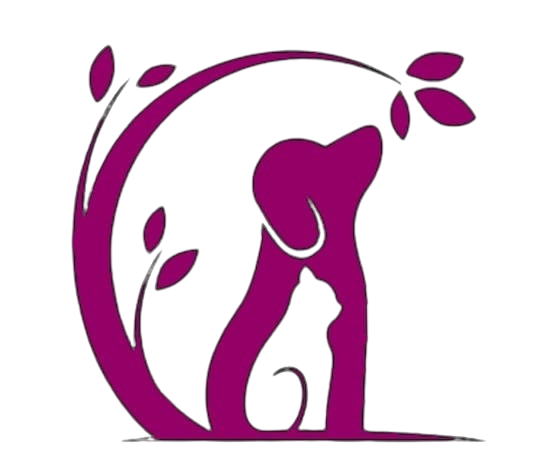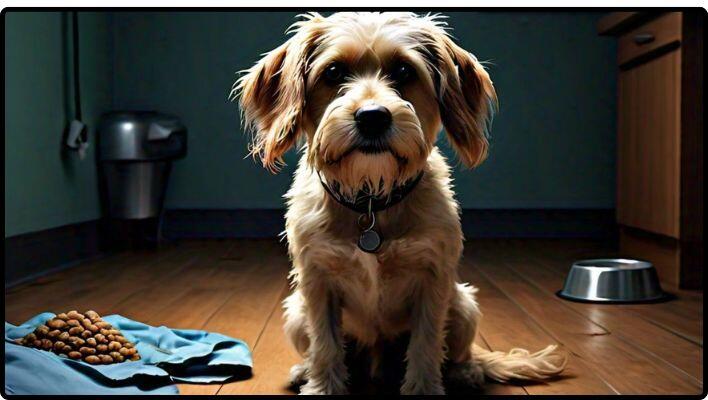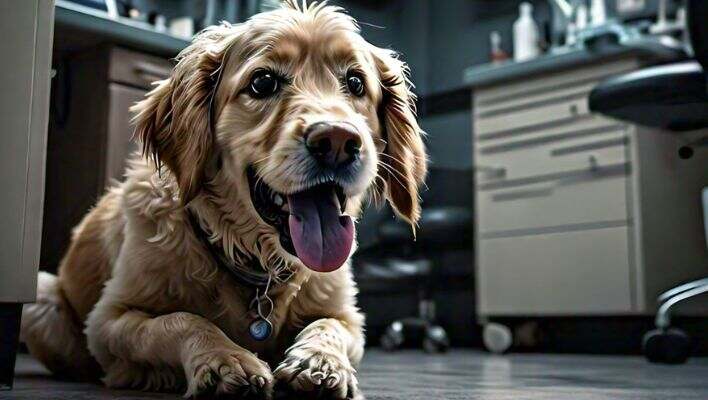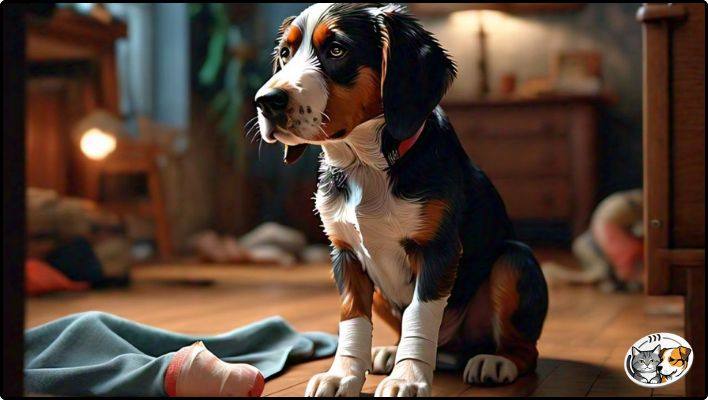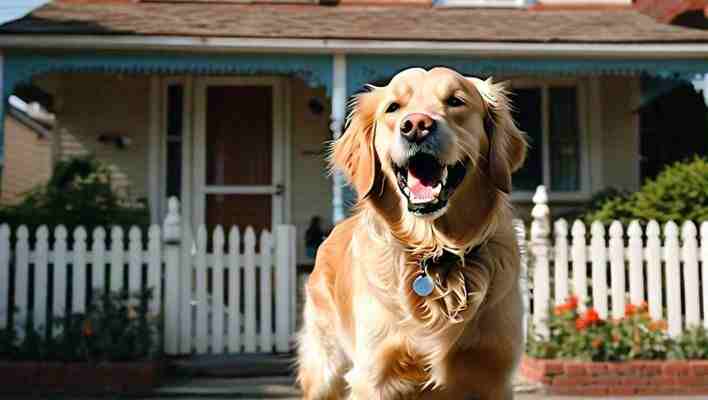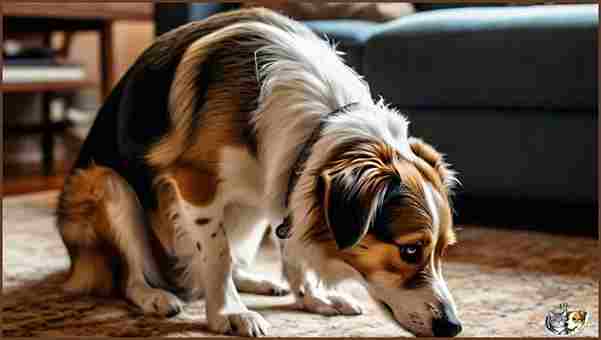Is a dog’s mouth cleaner than a human’s? Surprising Truth
Is a dog’s mouth cleaner than a human’s? A dog’s mouth and a human’s mouth are not comparable.
Although both species have some common bacterial types, dogs possess a wider range of dental bacteria not present in humans.
In Quick Information: A dog’s mouth is not cleaner than a human’s.
There are approximately 600 germ species in dog mouths, compared to the 615 growing varieties found in human mouths.
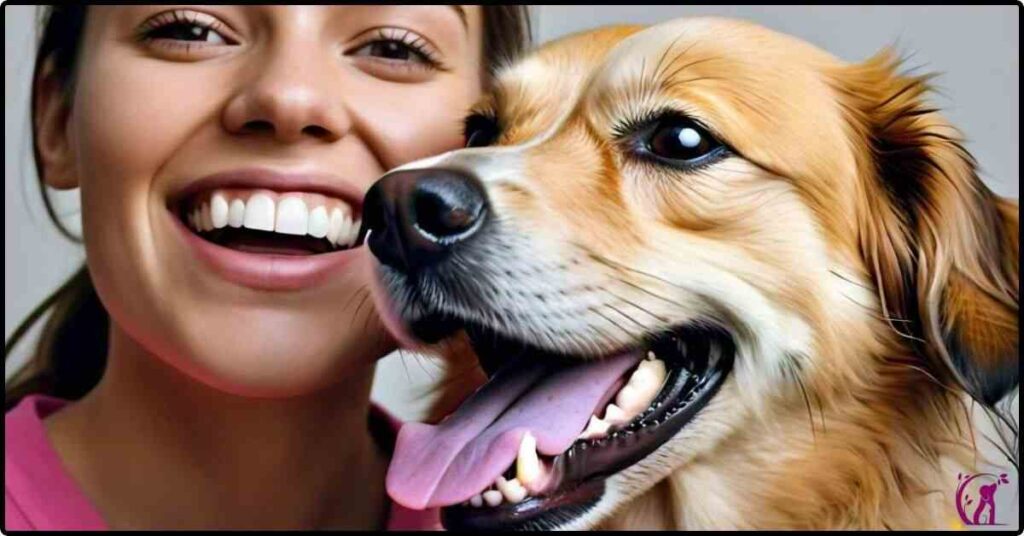
The bacterial family called Porphyromonas is an example of minor similarities found in dogs and humans. That may lead to periodontal disease in both dogs and humans.
As billions of germs gradually build up on the surface of the teeth, they cause bad breath, gum recession, tooth root abscesses, and damage to the bone surrounding the roots.
Early periodontal disease in dogs and humans is treatable with diligent at-home dental care, but they both need professional cleanings regularly to maintain dental health.
Is My Dog Mouth Cleaner Than Mine?
According to vet expert Colin Harvey, “A dog’s mouth and a human’s mouth are as different as apples and oranges.” There are many microbes in the mouths of both dogs and humans.
While your dog and you have some of the same oral bacteria, there are many bacteria in your dog’s mouth that aren’t in yours. The bacterial family Porphyromonas is linked to periodontal disease in humans and dogs.
Experts discovered that dogs carry P. gulae bacteria in their mouths, while people have similar bacteria called P. gingivalis. Both types of bacteria are seen as ‘dirty’ and can cause dental issues for dogs and people.
Gingivitis is the first step in periodontal disease, causing the gums to swell. Gingivitis starts when bacteria build up as dental plaque in your mouth.
Bacteria gradually gather on teeth, leading to bad breath, receding gums, tooth abscesses, and bone loss.
Early gum disease in dogs and humans can be managed with at-home dental care, and both need professional teeth cleaning from time to time.
Can You Get Infections and Diseases From Dog Saliva?
Bacteria and viruses can be transmitted by a dog’s saliva. There is a very small risk of getting infected from a dog’s saliva.
These can enter your skin if a dog bites you. If your dog’s saliva gets into your nose, mouth, or eyes, your body can absorb it and any germs it carries.
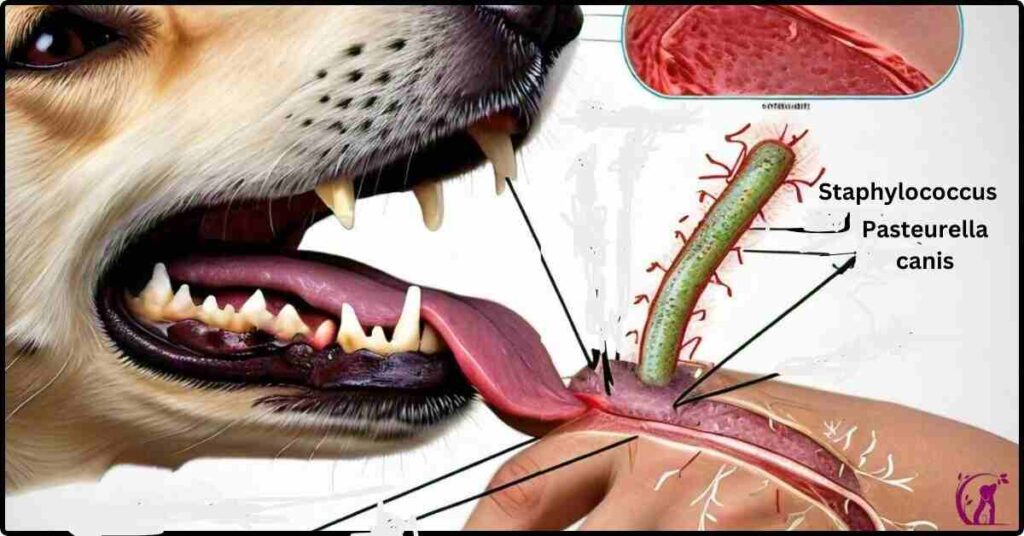
Bacterial Infections
If your dog bites, bacteria from its saliva can pass to you. One of these bacteria are:
| Bacteria | Spread Method | Effects | Common Signs |
|---|---|---|---|
| Capnocytophaga canimorsus | Through bite wounds | Serious infections, especially in people with weak immune systems | Fever, headache, sepsis |
| Pasteurella canis | Found in dog saliva | Causes infections after a dog bite | Redness, and swelling near the wound |
| Staphylococcus | Found in dog saliva | Causes skin infections | Red, swollen skin, pus formation |
If a dog bites you, wash the wound well with soap and water for 15 minutes before seeing a doctor. After cleaning the wound, go to a doctor right away. They might give you antibiotics to stop or treat an infection.
Make sure your dog gets its vaccinations on time and always keep clean to lower the chance of bacterial infections from dog bites.
Rabies
Rabies is one of the most serious infections that a dog can pass on through their saliva. Bites from infected animals are the main route for rabies transmission to humans through saliva.
Rabies is caused by a virus that attacks the central nervous system, causing serious swelling in the brain and spinal cord.
At first, it can feel like the flu with a fever, headache, and feeling tired. As it gets worse, you might feel more nervous, and confused, start seeing things that aren’t really there, and even have trouble moving.
When signs of rabies appear, it’s almost always fatal. Seeking immediate medical attention after a possible exposure is crucial.
This involves cleaning wounds thoroughly, getting vaccinated for rabies, and possibly receiving rabies immune globulin.
Preventive measures such as vaccinating pets and staying away from wild animals can reduce the chance of getting rabies. In places where rabies is widespread, educating the public and quick action are essential to avoid fatalities.
Is Dog Saliva Harmful to Babies?
While the chance of getting sick from dog saliva is small, those most at risk include:
- Kids under 5
- Adults over 65
- Pregnant women
- People without a working spleen
- And those with weaker immune systems.
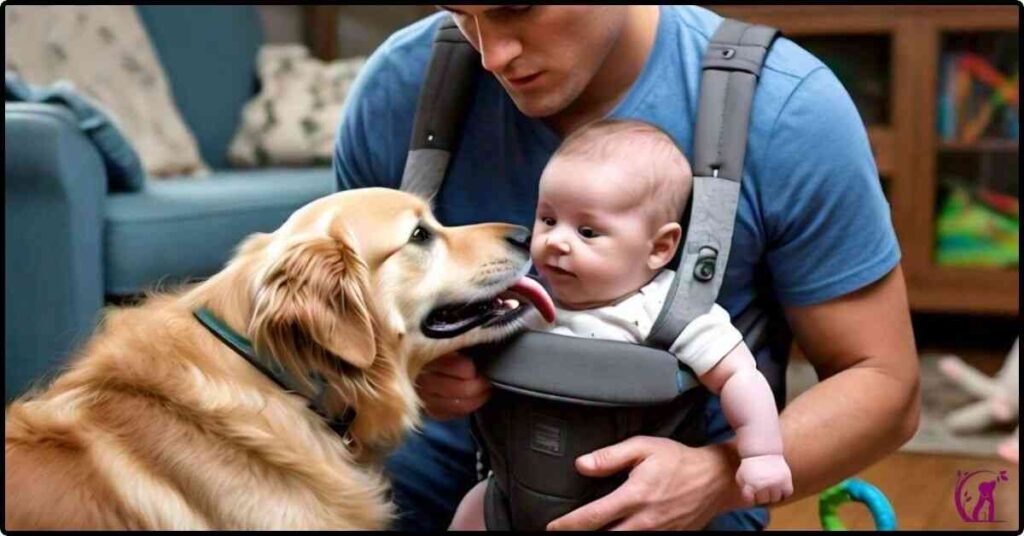
If you belong to these groups, it’s safest to stay away from dog saliva completely. Don’t leave your dog alone with children under 5 years old. If your dog tries to lick your child, just lift your child up where the dog can’t get to.
When your dog needs to calm down, try giving them a toy, taking them outside, or keeping them in a different room.
Is Dog Saliva Bad For Your Skin?
While dog saliva is usually harmless to your skin, it’s good to be cautious about a few points.
1. Bacteria:
Bacteria in dog saliva can lead to infections, particularly if you have any open cuts or wounds.
2. Allergic Reactions:
Dog saliva has proteins that can make some people allergic, causing skin irritation or rashes.
3. Parasites:
Dog saliva can sometimes contain parasites that might be passed to humans, but this is rare.
4. Hygiene:
After a dog licks you, it’s a good idea to wash your skin to stay safe.
It’s generally okay for most people to get licked by a healthy dog occasionally. Just remember to keep clean and be cautious if you have skin troubles or allergies.
Can Dog Saliva Heal Wounds?
As we discuss dog mouths, there’s a common belief that dog saliva helps in healing wounds. This can be confusing. Humans and most other mammals lick their wounds.
People in the past thought that the saliva from dogs could help heal injuries. Both the Greeks and Egyptians believed in the healing power of dog saliva and used dogs in their religious rituals.
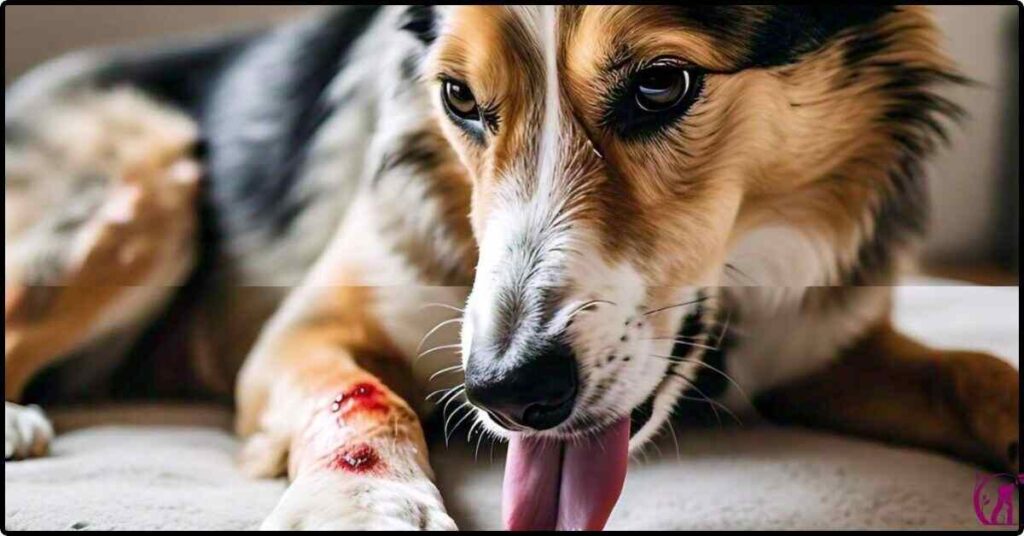
There could be healing benefits from just licking a wound. Cleaning dirt and debris from the wound with the tongue helps keep the wound from getting infected.
When dogs lick a lot, they can create sores like hot spots, which can become more serious.
Read: How to Clean Dog Wounds
How to Keep Your Dog’s Mouth Clean?
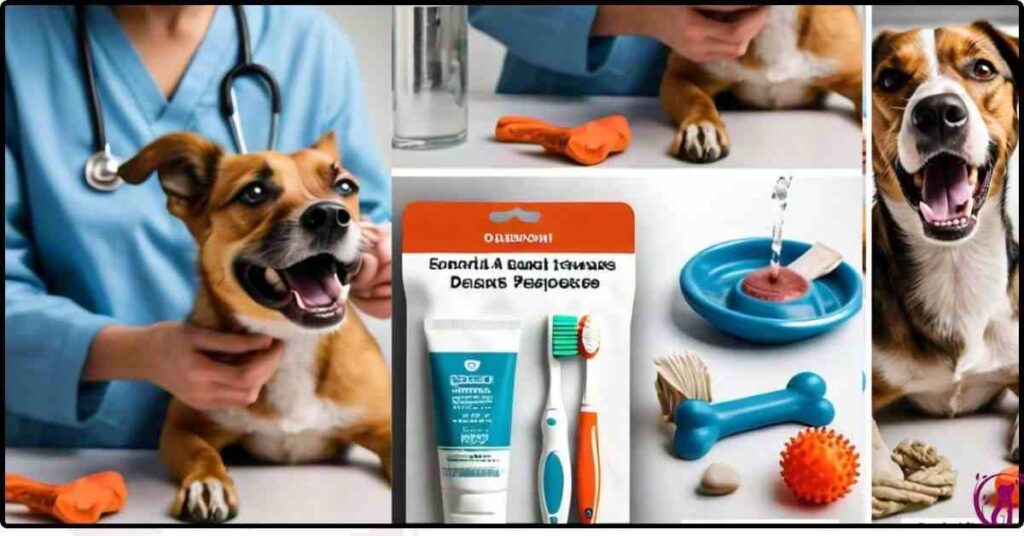
Here are five ways to keep your dog’s teeth and mouth clean and get rid of bad breath:
- Brushing: Don’t forget to brush your dog’s teeth with a toothbrush and toothpaste made for dogs on a regular basis.
- Chew Toys: Help your dog’s dental hygiene with chew toys that clean teeth and massage gums.
- Diet: Select a diet that supports your dog’s dental health, like special food or treats made for teeth. Dehydrated beef liver chews are great for dental health, helping to reduce plaque and tartar buildup on your dog’s teeth.
- Regular Check-ups: Don’t forget to schedule regular vet visits to keep an eye on your pet’s dental health and catch problems before they get serious.
- Water: Make sure your dog can drink clean water whenever they need to wash away food particles and germs.
Should I brush my dog’s teeth?
Make it a habit to brush your dog’s teeth regularly to avoid plaque and tartar buildup, which could cause gum disease and other health issues. Use dog toothpaste a few times weekly for best results.
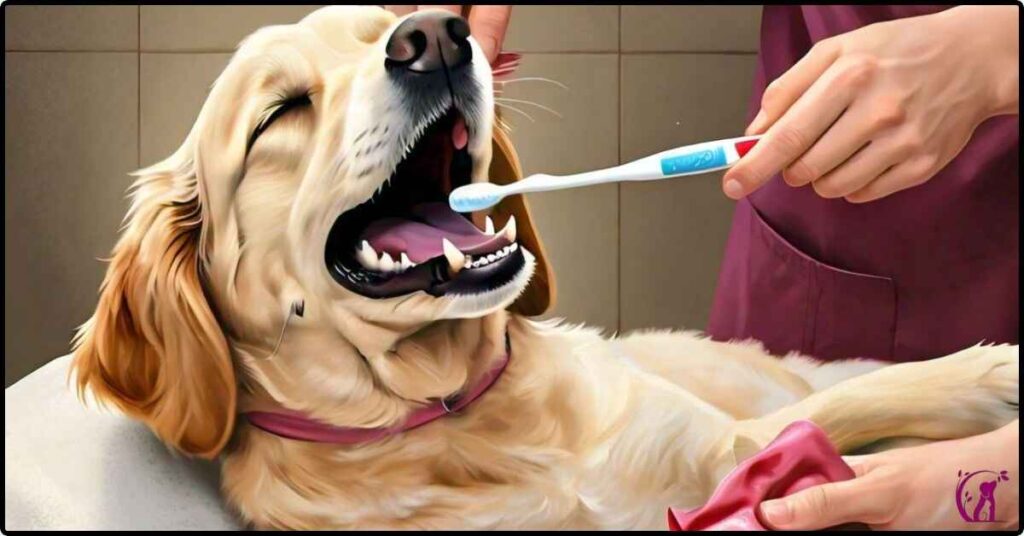
Here are some easy ways to keep your dog’s teeth clean:
- Make it a habit to brush your pet’s teeth daily using a finger brush from your vet or a child’s toothbrush to get rid of plaque and food pieces. It’s as simple as brushing your teeth.
- If your dog doesn’t like teeth cleaning, use toothpaste made for dogs in flavors they enjoy. With this toothpaste, brushing your dog’s teeth becomes a pleasure.
- Get a plaque-prevention product from your vet. Apply it on your pet’s teeth to protect against plaque buildup.
- Give your pup dental chews or special food to protect their teeth from plaque and tartar buildup.
How to Keep Your Dog From Licking You?
For people allergic to dog saliva or with compromised immune systems, it’s important to prevent your dog from licking or kissing you. It might seem tough, but practice makes a big difference.

When your dog licks you, stand up and move away. Ignoring them shows licking won’t get them attention or treats. If you have cuts from injury, keep your dog from licking them to avoid infection, because dog saliva can cause harm.
To protect wounds, cover them with clothing or a bandage to avoid exposure to your dog’s saliva.
Taking care of your pet’s teeth is important for their health. Arrange their annual dental appointment today to ensure your dog stays in good shape.
Note: “This post offers information, not medical advice for pets. To diagnose your pet’s condition, please see your vet.”
FAQs related to Is a dog’s mouth cleaner than a human’s?
Is dog mouthwash safe?
According to Feyrecilde, dog mouthwashes, and water additives are generally safe. Pet parents should consistently verify that the label is free of xylitol or birch sugars, which can be toxic to dogs.
Can I use toothpaste on my dog?
It’s not advisable to swallow the ingredients found in human toothpaste. If consumed, it might result in an upset stomach or gastrointestinal disturbances.
Is it safe for dogs to lick your mouth?
Dr. Leni K. Kaplan, an expert from Cornell University’s College of Veterinary Medicine, advised in the Times that dog owners should prevent their pets from kissing their mouth, nose, and eyes to avoid the transmission of pathogens such as salmonella and E. coli.
Why do dogs lick you?
Your dog might lick you to express their affection, grab your attention, calm themselves when stressed, show empathy, or simply because they enjoy your taste.
Do dogs like being hugged?
In general, dogs tend to avoid hugs, though their personalities can differ. Some dogs may intensely dislike hugs, while others might be fond of them.
